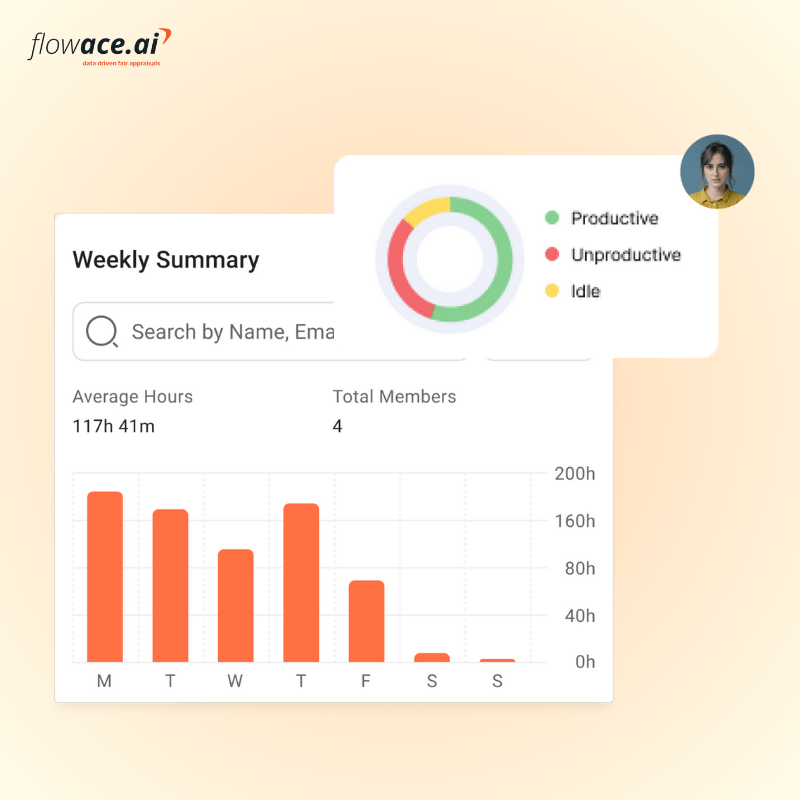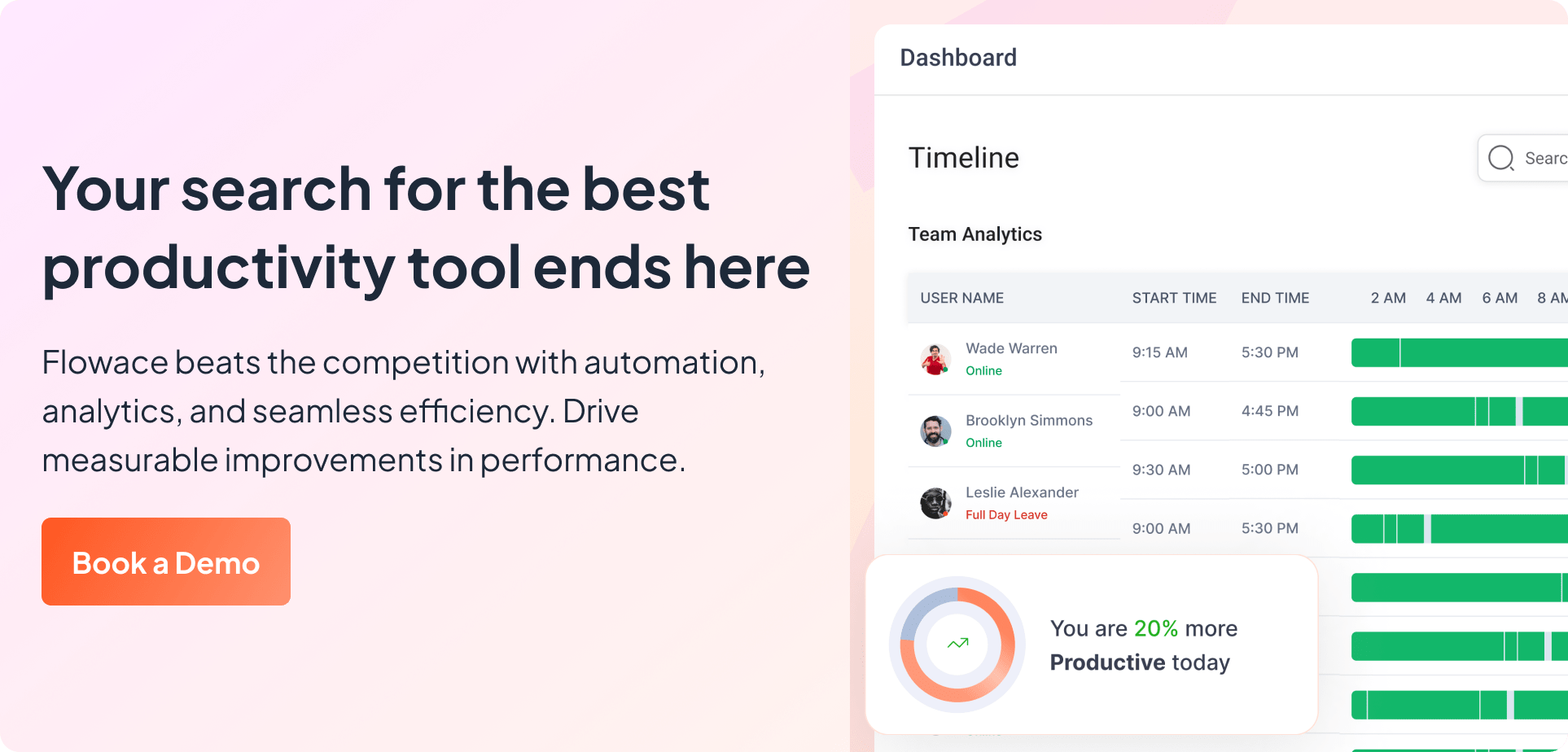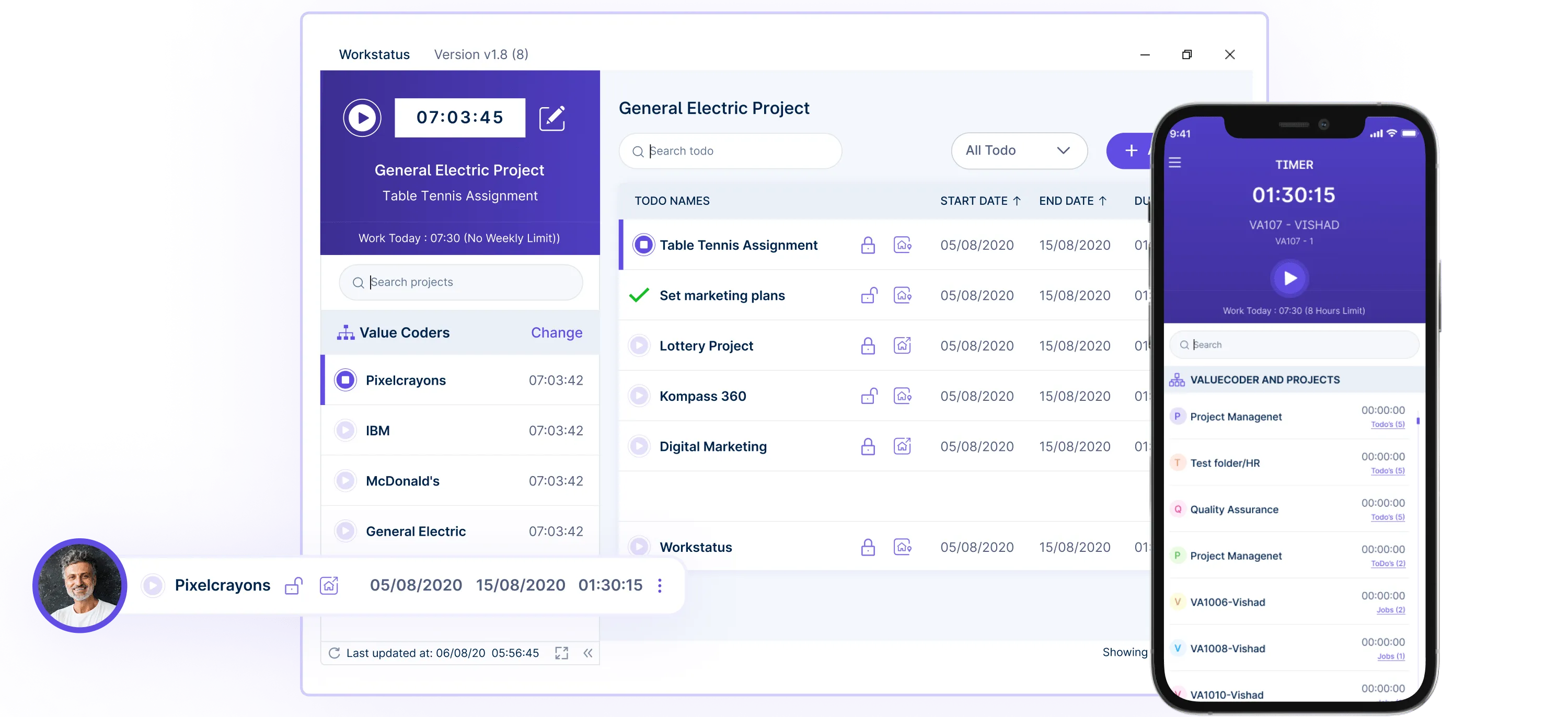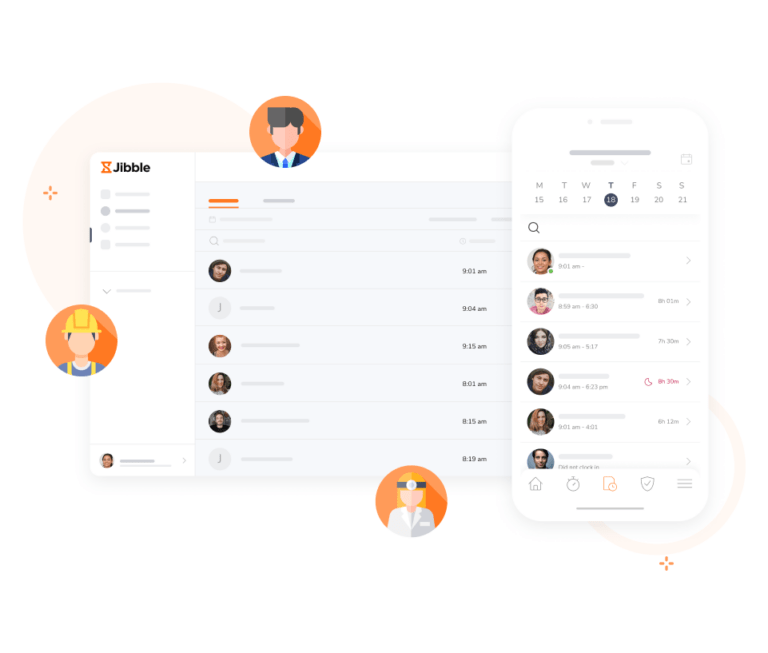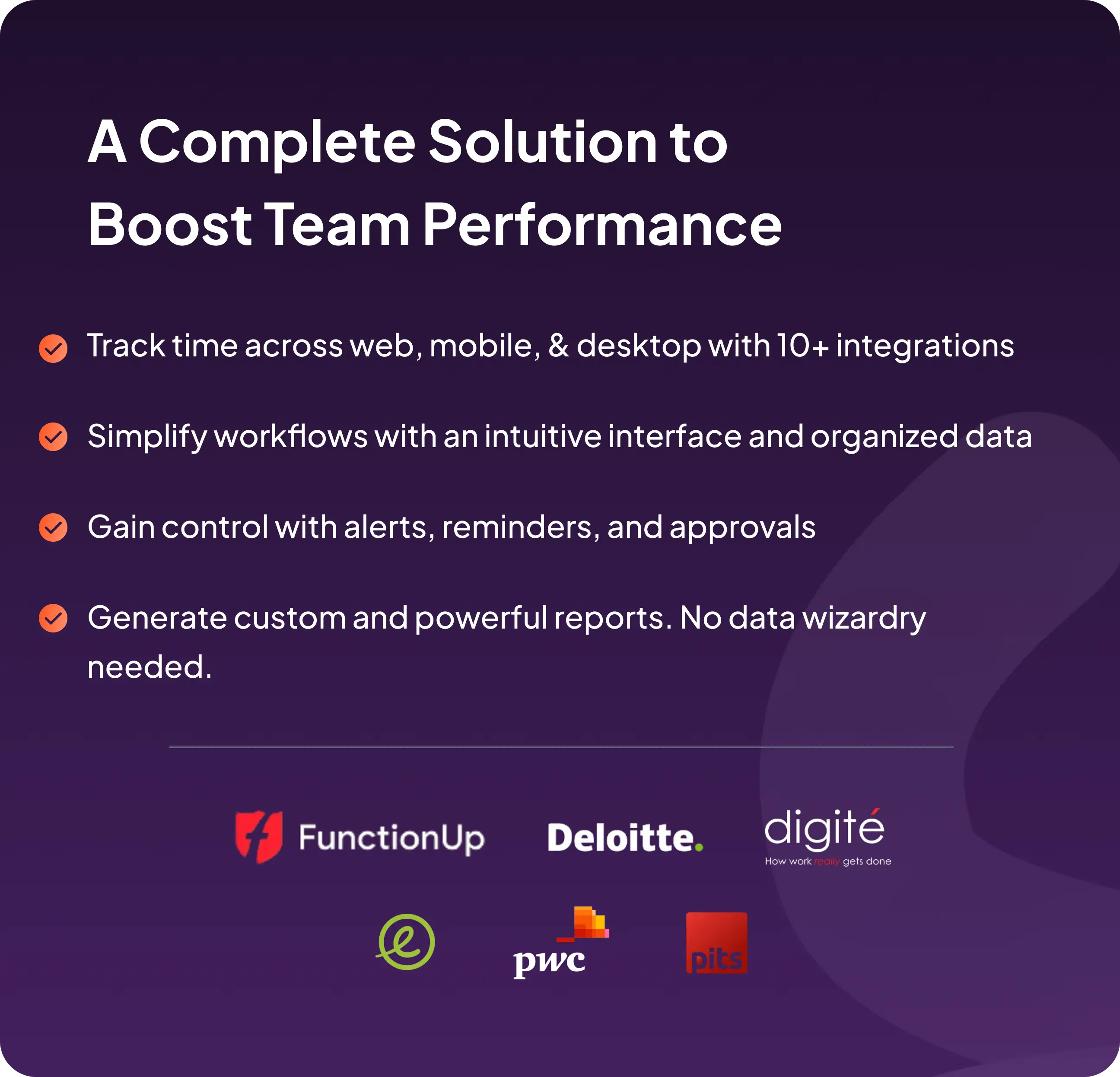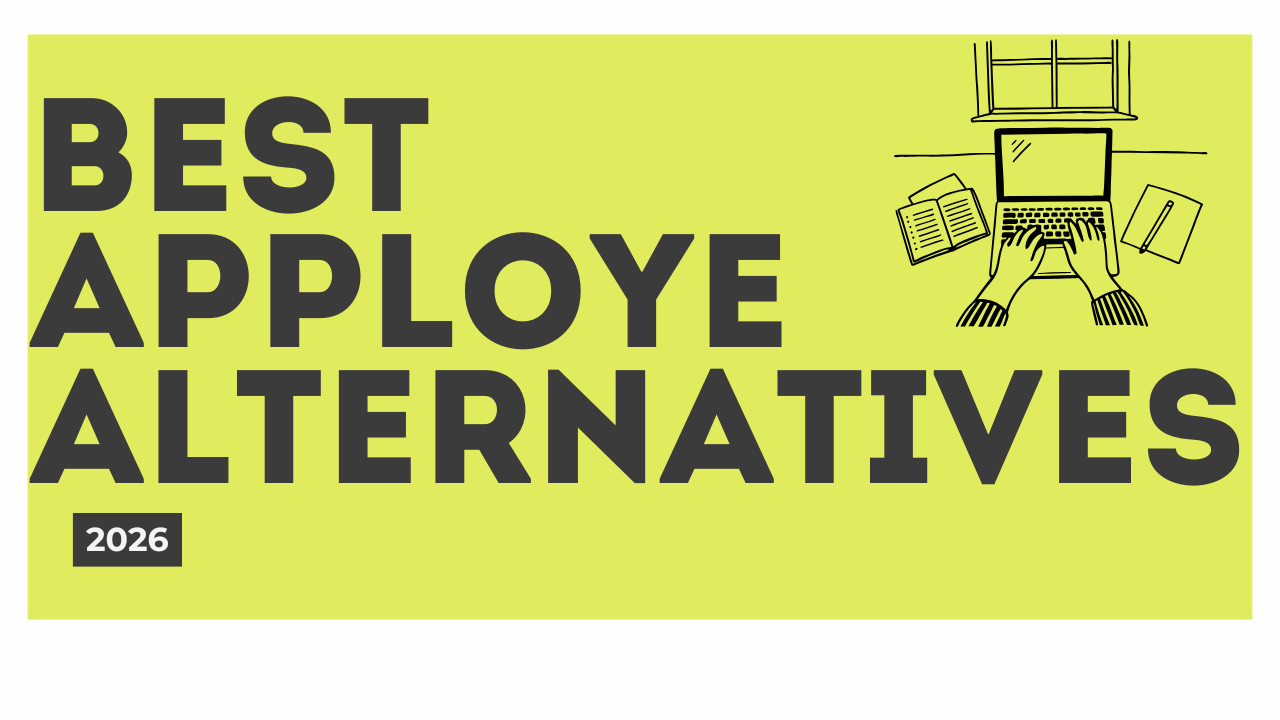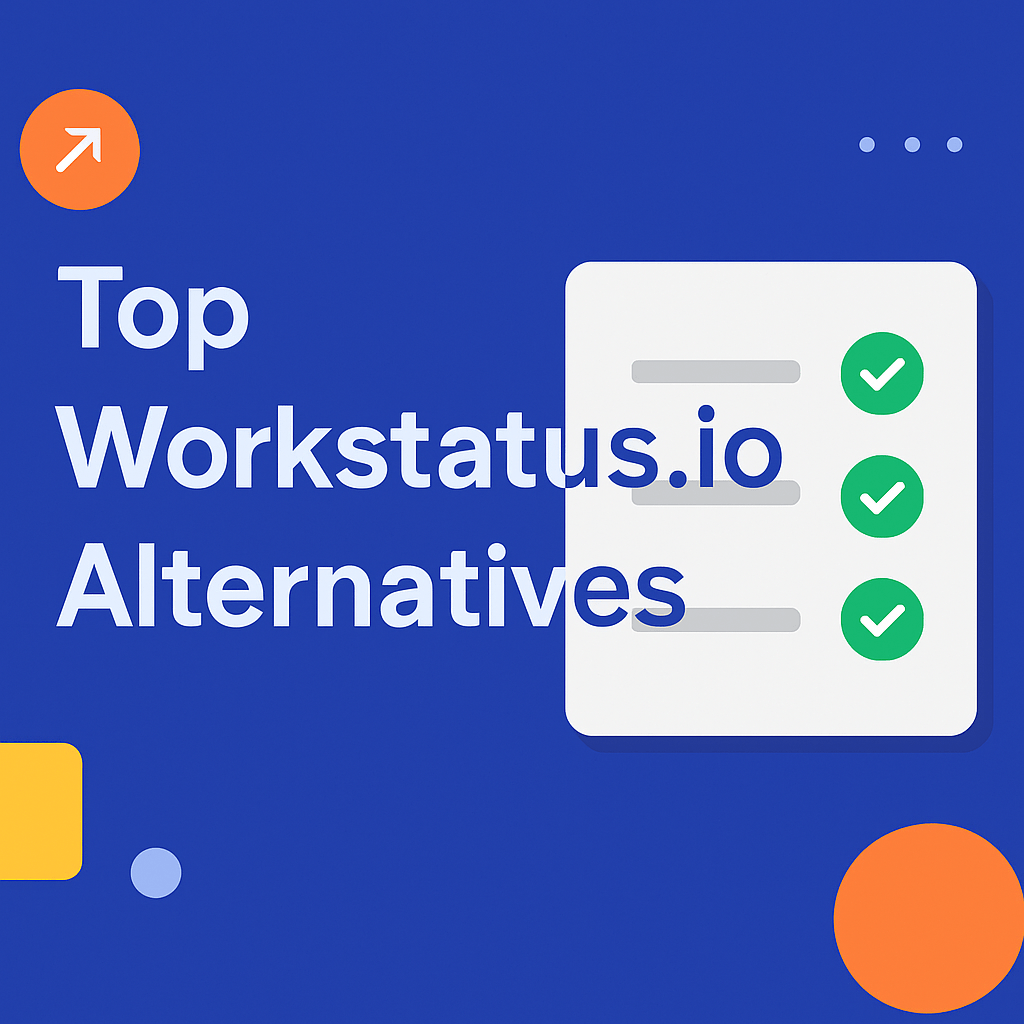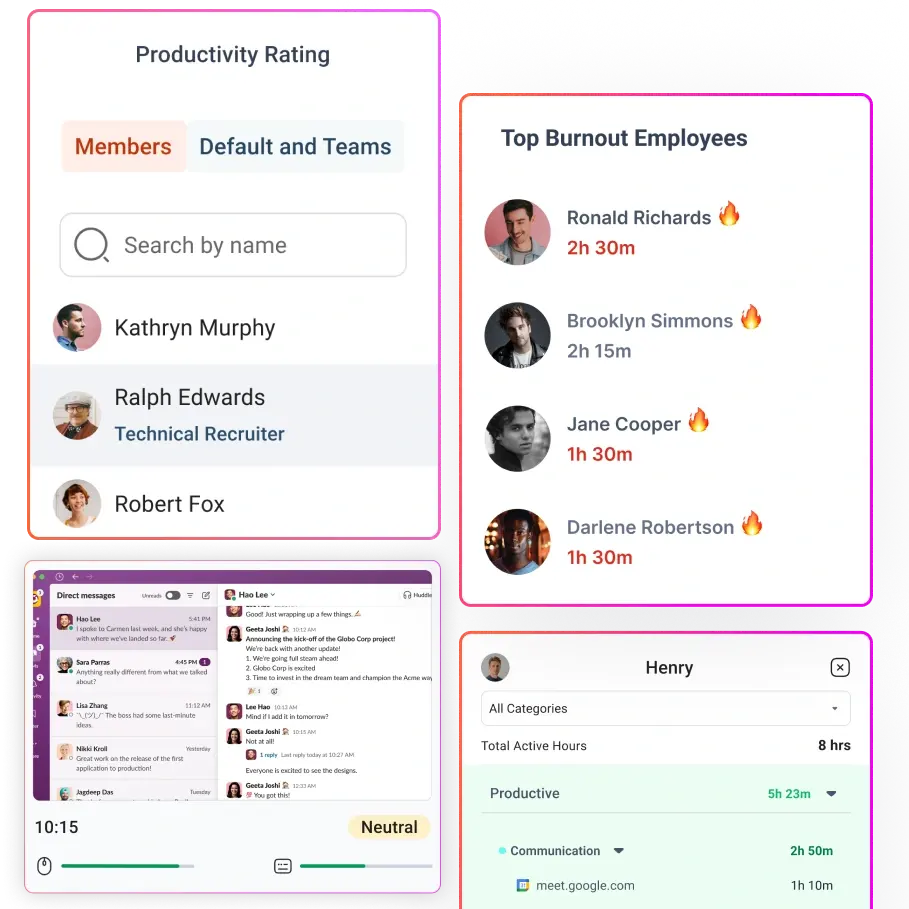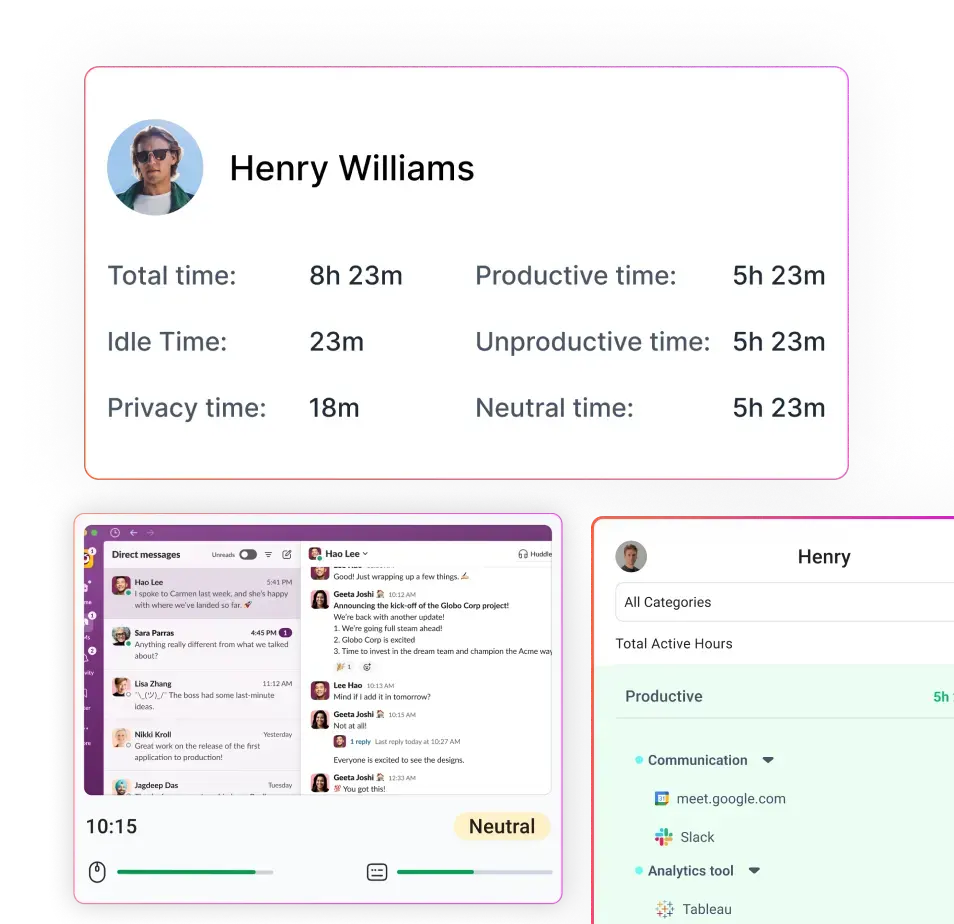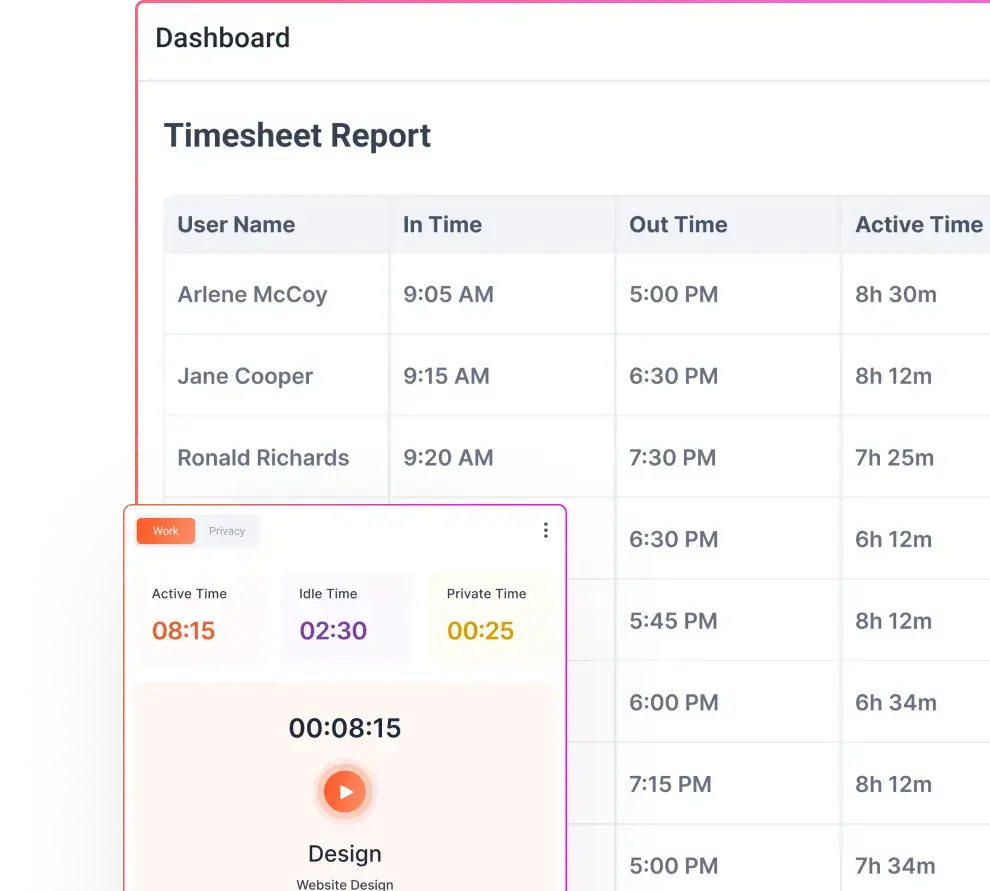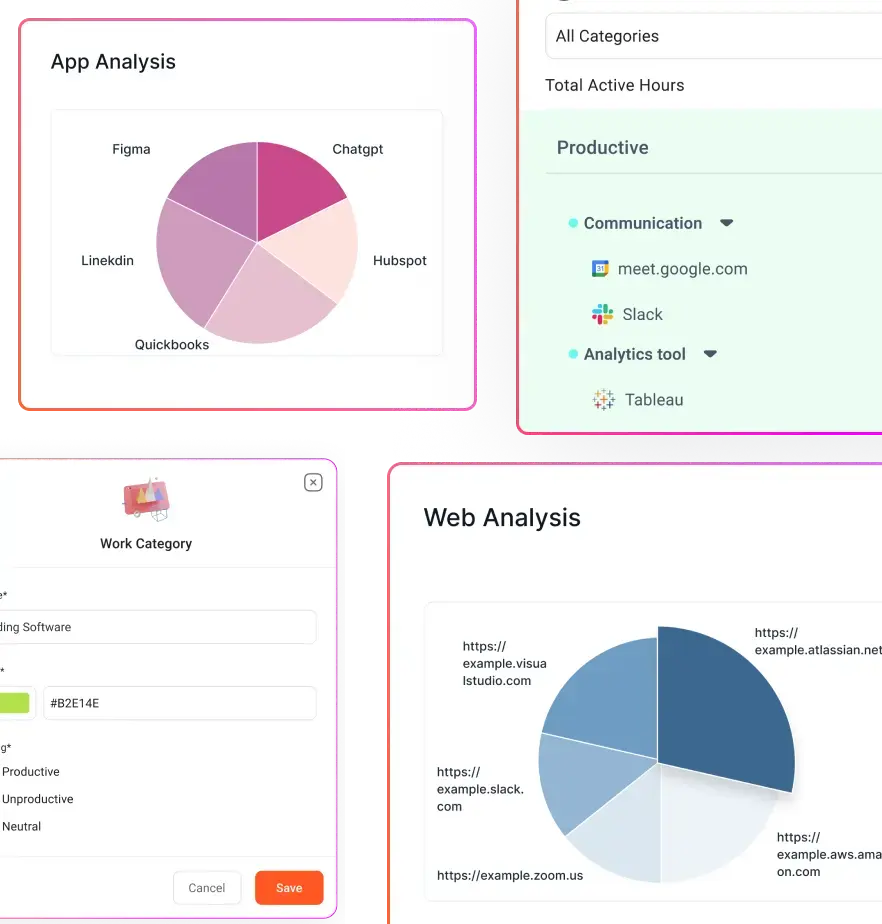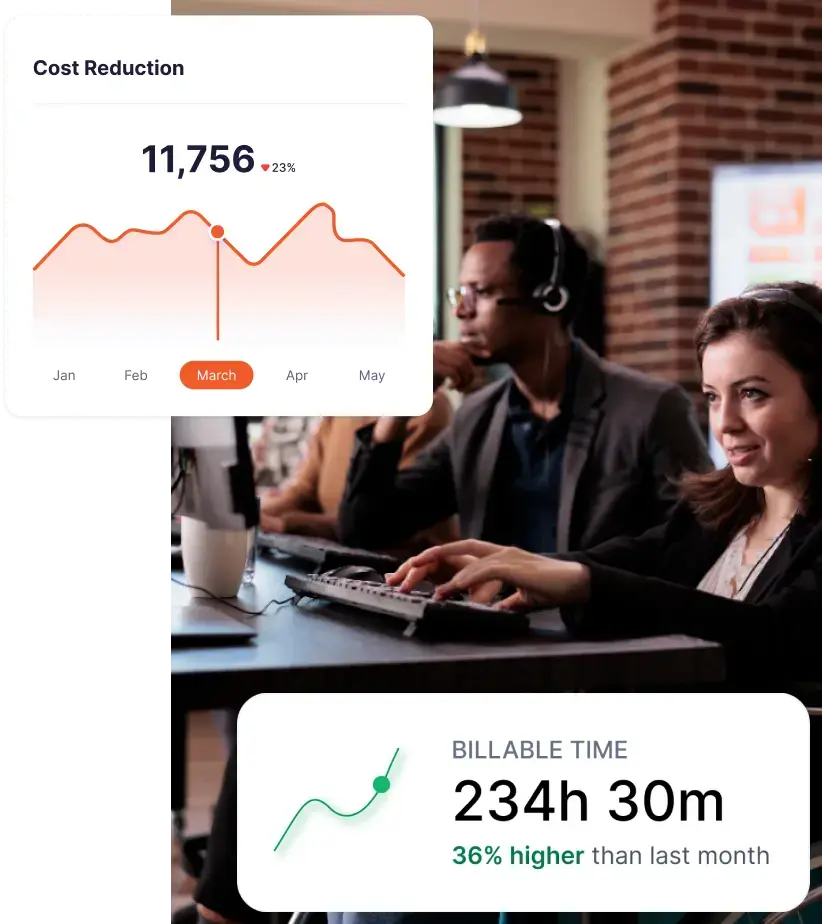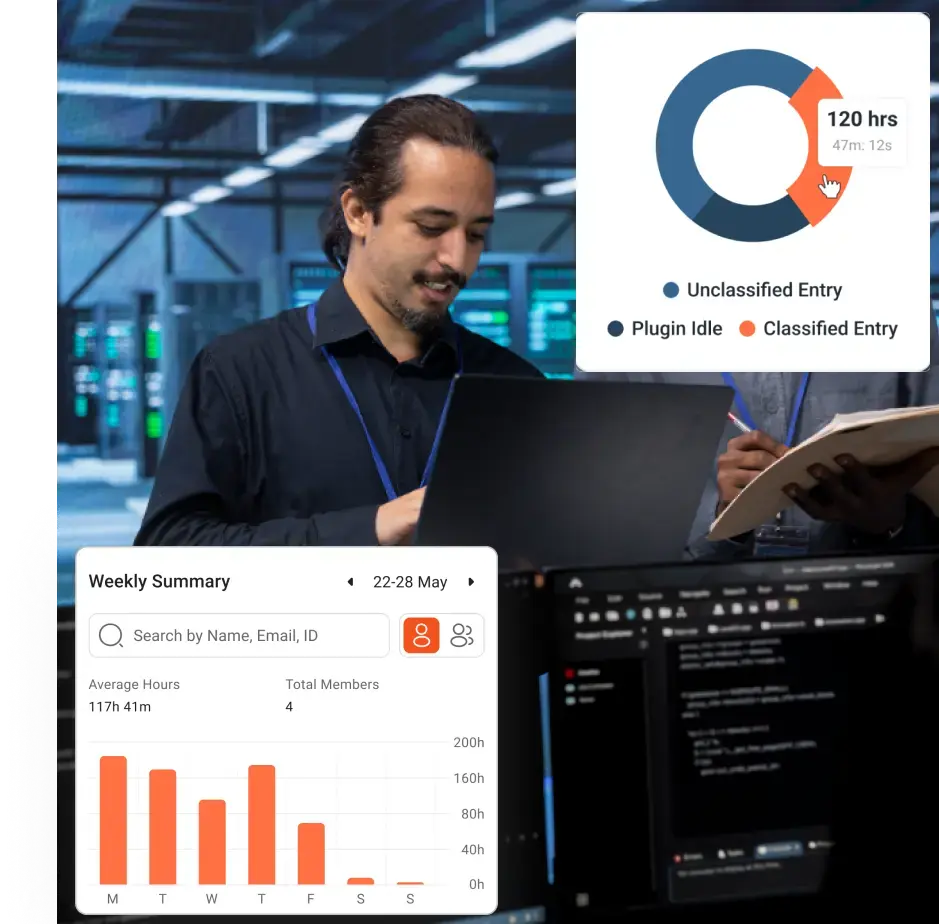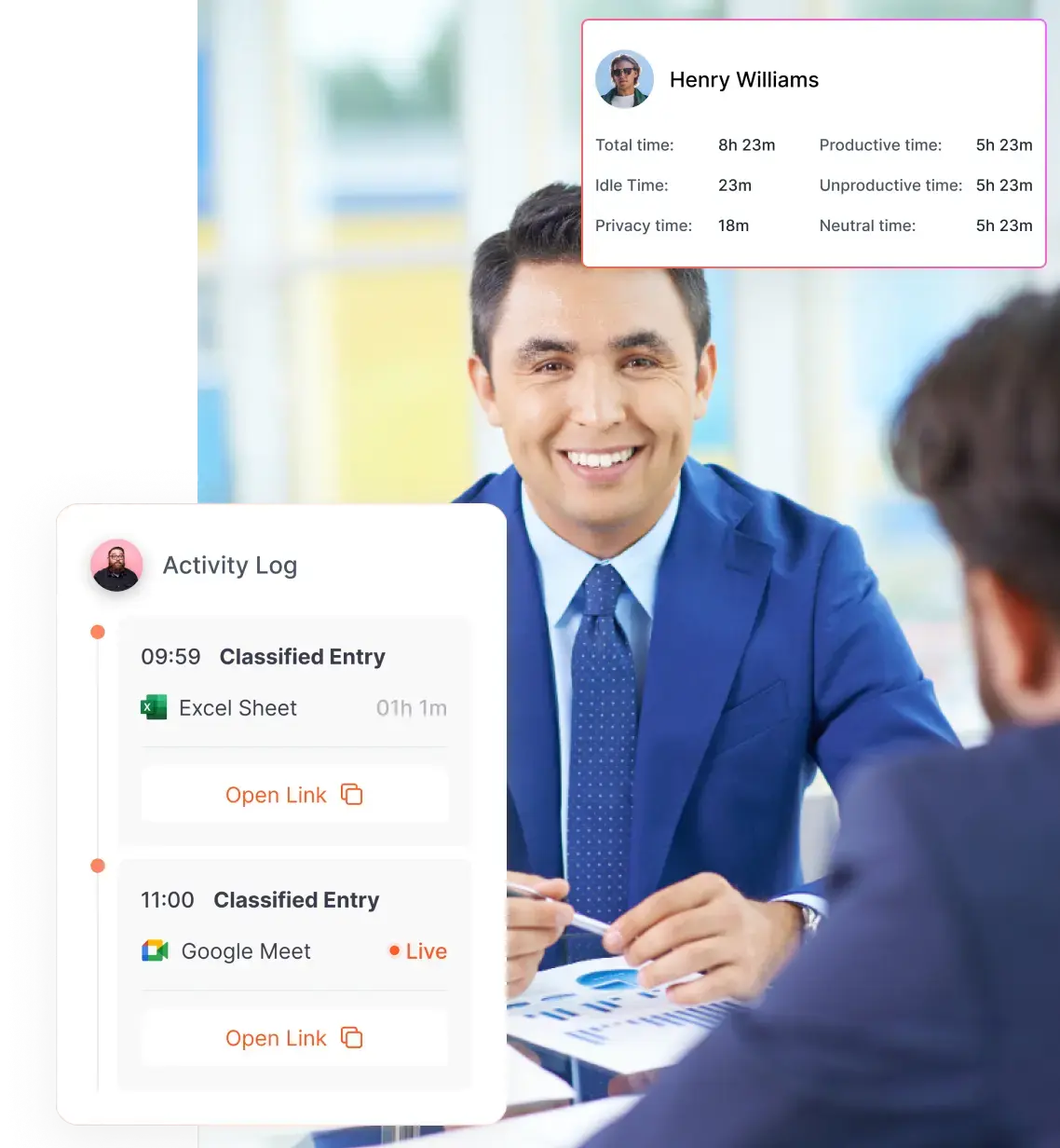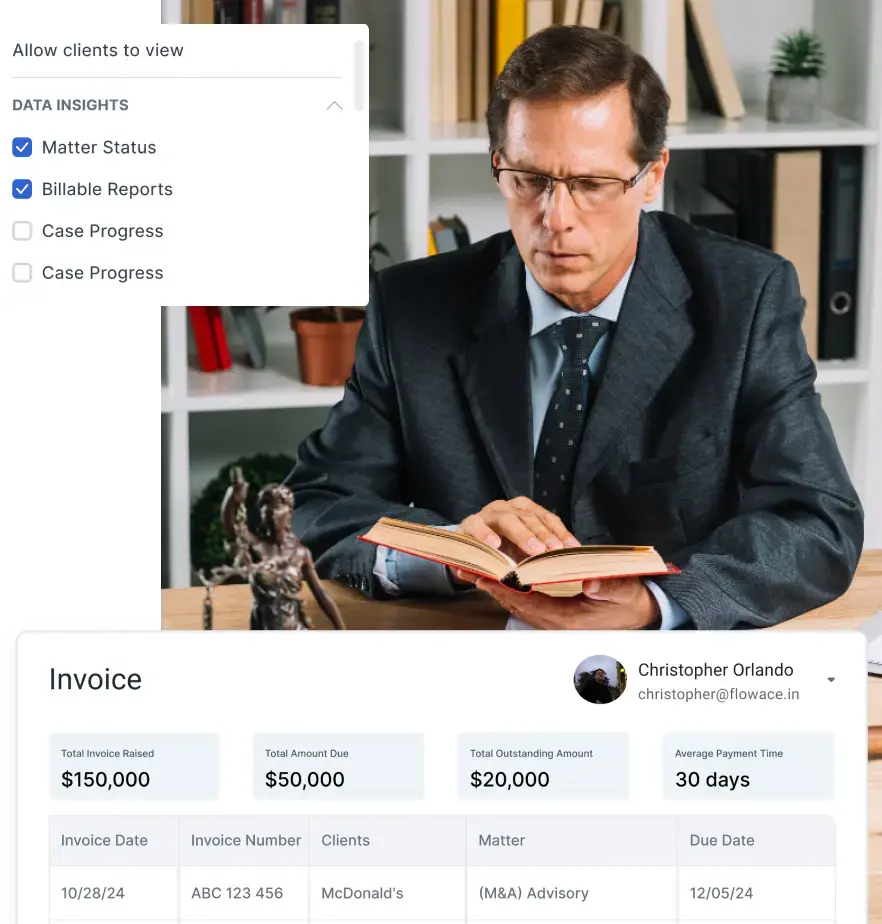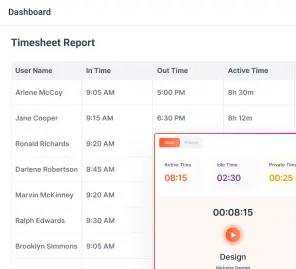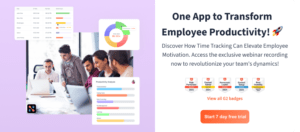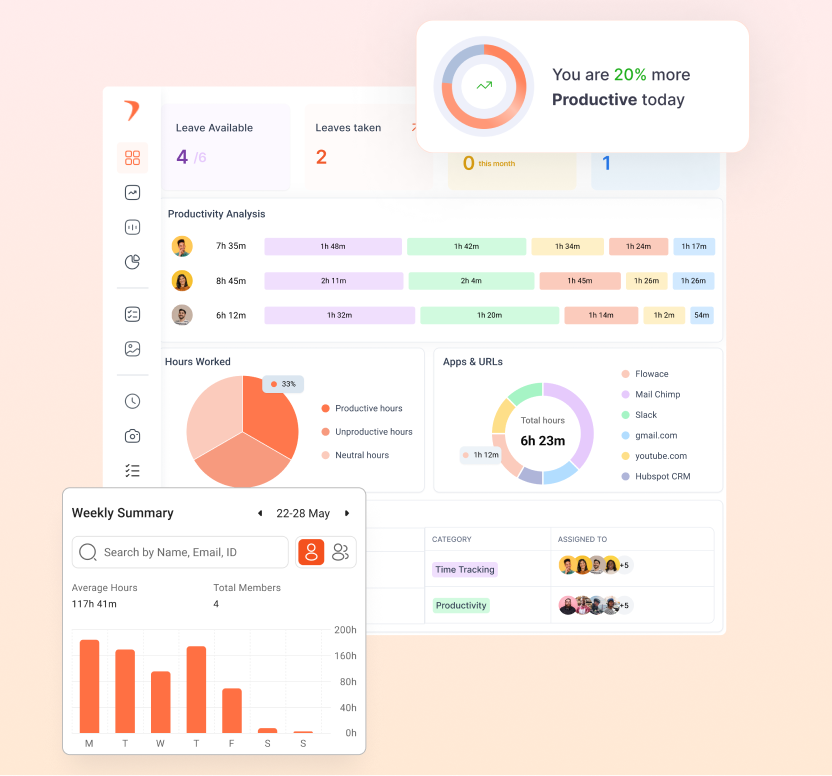Key Takeaways
- WebWork is feature-rich but not always flexible. Its reliance on screenshots and manual entries can feel outdated or invasive for modern, remote, or privacy-conscious teams.
- Flowace stands out as the top alternative. It offers automatic tracking, privacy-first monitoring, and deep productivity insights at a fraction of the cost.
- Many tools offer different strengths. Tools like Trello, ClickUp, and Notion excel in project management, while Hubstaff and Timely shine in productivity and workforce tracking.
- Consider your team’s specific needs. Whether it’s user experience, automation, pricing, or reporting depth, the best WebWork alternative will align with your goals and team structure.
- Flowace is purpose-built for modern teams. From remote workers to scaling businesses, it adapts easily while maintaining visibility, automation, and trust.
With so many time-tracking and productivity tools, finding the right one can be overwhelming.
But whether you are looking for an advanced feature or a budget-friendly option, we’ll help you find the WebWork Time Tracker Alternatives that will empower your team to thrive.
Why Look for a Webwork Alternative?
If you’re using WebWork and feel like something’s missing, you’re not alone. While it’s packed with features, it might not fit every team’s style or budget. The good news? You have better options.
Here’s why you might want to look for a WebWork alternative:
-
You want more flexibility. WebWork tracks time well but relies heavily on manual entries and screen captures. Tools like Flowace or Timely offer automatic tracking, which saves time and reduces errors.
-
You need better privacy controls. Not all teams like screenshot-based monitoring. Some alternatives give you more respectful ways to measure productivity without invading privacy.
-
You want smoother workflows. WebWork’s UI can feel clunky, and managing tasks or switching projects isn’t always intuitive. Many modern tools like ClickUp or Flowace offer a cleaner, more user-friendly experience.
-
You’re growing fast. WebWork’s features are solid for small teams, but scaling with it can get expensive or limited. Some tools give you more advanced dashboards, AI insights, and flexible team management, without the price tag.
-
You need deeper insights. WebWork provides basic productivity data. But what if you could get real-time reports, AI-driven alerts, and even burnout detection? That’s what smarter tools now offer.
When Would WebWork Be a Good Fit For You?
WebWork might not be the flashiest tool out there, but it shines in specific scenarios. You’ll likely find it a good fit if:
You manage remote or hybrid teams
WebWork’s screenshot monitoring, activity tracking, and attendance logs give you clear visibility into what distributed teams are doing throughout the day.
You need detailed productivity analytics
The platform breaks down time spent on tasks, apps, and websites — helping managers understand where hours go and which activities drive results.
You want to measure billable hours accurately
Freelancers, agencies, and service-based teams can benefit from its automatic time tracking and invoice-ready reporting.
You prefer a monitoring-first approach
If accountability and oversight are key priorities for your team’s workflow, WebWork’s features (screenshots, app/URL tracking, etc.) offer tight control.
You’re on a budget
Compared to many enterprise-grade tracking tools, WebWork offers a wide range of monitoring and reporting features at a lower price point.
You want all-in-one tracking and communication
WebWork includes chat, task management, and attendance tracking, reducing the need for multiple tools.
You handle multiple projects or clients
The platform allows you to separate and track work across projects, making it easier to analyze productivity per client or team.
Time-Tracking from the Lens of WebWork
WebWork Time Tracker is a time tracking and project management platform that enhances employee productivity software. It offers a range of features to streamline workflows and boost business efficiency. Some of its features are as follows:
- Advanced Time Tracking: Effortlessly capture time spent on projects through manual entries, automatic tracking, or browser extensions.
- Screenshot Monitoring: Gain insights into team activity levels with optional screenshot capture during time tracking.
- Attendance Monitoring: Monitor employee attendance and working hours for both remote and in-office teams.
- Detailed Reports: Generate comprehensive timesheets and reports to analyze team productivity and identify potential areas for improvement.
- Project & Task Management: Assign tasks to team members, track progress, and monitor deadlines within the platform.
- Integration: Seamlessly integrates with Jira, ClickUp, Slack, Zapier, Asana, etc.
- Real-time Dashboards: Gain instant insights into project progress and team activity through visual dashboards.
- Activity Level Tracking: Analyze keyboard and mouse usage to understand individual and team activity levels.
- Billable Hours & Invoicing: Calculate and generate invoices based on tracked billable hours for each project.
- App & Website Usage Monitoring: Monitor which applications and websites employees use during work hours.
Benefits of WebWork
By leveraging WebWork’s features, businesses can potentially experience
- Increased productivity and efficiency through time tracking and activity monitoring
- Improved project management with task tracking, real-time dashboards, and Asana integration
- Enhanced transparency and accountability within teams
- Accurate billing practices with billable hour tracking and invoicing
- Data-driven decision-making based on insights from detailed reports and analytics
WebWork tracker pricing starts from $3.99 per user/month.
WebWork tracker ratings and reviews: (Capterra: 4.3/5, G2: 4.7/5)
Cons of WebWork
While WebWork offers a decent suite of features for time tracking and productivity monitoring, it’s not without its drawbacks, especially for modern teams looking for flexibility, automation, and privacy.
Here are some of the major limitations:
- Heavy reliance on manual input: WebWork often requires manual task assignment and tagging, which can slow down workflows and create friction for users who prefer automated systems.
- User interface feels outdated: Compared to newer platforms, WebWork’s UI lacks polish and intuitiveness, making onboarding and daily usage less efficient.
- Limited scalability: As teams grow, the platform struggles to offer the depth of reporting and customization that large-scale organizations need.
- Occasional sync issues: Users have reported inconsistencies in time logs and minor lags when switching between devices or workspaces.
- Not ideal for all industries: WebWork works well for simple service-based teams, but lacks the versatility needed for complex workflows in logistics, manufacturing, or agile tech environments.
How Did We Choose and Evaluate These WebWork Tracker Alternatives?
With hundreds of time-tracking and productivity tools available today, narrowing down the best alternatives to WebWork required a structured and unbiased approach. To ensure this list truly reflects the best-in-class options for different team needs, we evaluated each tool based on a set of key criteria that matter most to modern teams.
Here’s how we chose and ranked the tools:
1. Feature Depth and Relevance
We examined how each tool handles core time-tracking capabilities — including automatic tracking, manual logging, website and app usage insights, and project-level reporting. Tools offering innovative features such as AI-driven analytics, privacy-first monitoring, or advanced dashboards scored higher.
2. Ease of Use and User Experience
A time-tracking tool should simplify work, not add more complexity. We looked closely at the interface design, setup process, and learning curve for each platform. Solutions with intuitive navigation, automation, and minimal manual input earned better rankings.
3. Privacy and Employee Trust
Given that many teams today are remote or hybrid, we prioritized tools that respect employee privacy. Solutions that offer flexible monitoring settings — such as optional screenshots, customizable tracking, and transparent policies — were rated higher than invasive trackers.
4. Pricing and Scalability
We compared the value-for-money ratio of each platform, assessing both affordability for small teams and scalability for growing organizations. Tools offering flexible pricing plans, transparent billing, and enterprise-grade capabilities were considered ideal choices.
5. Integration Ecosystem
Productivity thrives when tools connect seamlessly. We evaluated how well each platform integrates with popular work apps such as Slack, Asana, Jira, Google Workspace, and ClickUp. Strong integration support ensures smoother workflows and centralized data management.
6. Customer Reviews and Ratings
To validate our research, we analyzed verified user feedback from platforms like G2, Capterra, and Trustpilot. Tools with consistently high ratings for performance, support, and reliability stood out in our selection.
7. Unique Strengths and Use Cases
Finally, we considered what makes each tool unique — whether it’s automation, AI-powered analytics, project management focus, or mobile accessibility. This helped us recommend the right mix of options for teams with varying priorities.
Comparison Table: WebWork Time Tracker Alternatives
| Tool | Auto Time Tracking | Manual Time Tracking | Website & App Tracking | Distraction Alerts | Payroll & Invoicing | GPS Tracking | Employee Monitoring | Project Tracking | AI Workforce Insights | Privacy-Friendly | Starting Price (USD/user/mo) |
|---|---|---|---|---|---|---|---|---|---|---|---|
| Flowace | Yes | Yes | Yes | Yes | Yes | No | Yes | Yes | Yes | Yes | $1.99 |
| Time Doctor | Yes | No | Yes | Yes | Yes | No | Yes | No | No | No | $5.90 |
| Hubstaff | Yes | Yes | Yes | No | Yes | Yes | Yes | Yes | No | No | $7.00 |
| ActivTrak | Yes | No | Yes | Yes | No | No | Yes | No | Yes | Yes | $10.00 |
| Insightful | Yes | Yes | Yes | No | No | No | Yes | Yes | Yes | Yes | $6.40 |
| TimeCamp | Yes | Yes | No | No | Yes | No | Yes | Yes | No | No | $7.99 |
| Clockify | Yes | Yes | No | No | No | No | Yes | Yes | No | No | $7.99 |
| VeriClock | Yes | Yes | No | No | No | Yes | Yes | No | No | No | $10.00 |
15 Best WebWork Tracker Alternatives of 2025
This list offers a mix of features, some specializing in employee monitoring, project management, or invoicing alongside time tracking. Consider your specific needs and budget when choosing the best WebWork Tracker alternative for you.
- Flowace
- Trello
- Asana
- Monday
- ClickUp
- Notion
- Notion
- Hubstaff
- Timely
- Toggl Track
- RescueTime
- Time Doctor
- Desktime
- Workstatus
- Jibble
1. Flowace
Flowace is an innovative time-tracking and productivity management tool designed to streamline workflow and enhance team collaboration. With its intuitive interface and robust features, Flowace offers businesses a comprehensive solution for tracking time, managing tasks, and optimizing productivity effectively.
Best Features
- Provides real-time insights into employee activities, empowering managers to track tasks, monitor progress, and identify areas for improvement.
- Offers customized dashboards that allow users to visualize key performance metrics and track productivity trends effortlessly.
- Streamlines workflow processes with task automation features, increasing efficiency and reducing manual workload.
- Seamlessly integrates with popular business tools and software, enhancing collaboration and streamlining workflows across teams and departments.
- Allows you to gain productivity insights from remote employees and freelancers.
- Options like geo-tracking and geo-fencing are available.
Limitations
- While navigating Flowace’s advanced features and customization options, some users may experience a learning curve.
- Effectiveness is limited when employees work offline, as it heavily relies on real-time tracking.
Pricing
Flowace offers flexible pricing plans tailored to suit the needs of businesses of all sizes. Basic plans start from $1.99 /user/month. Contact Flowace for further detailed pricing information.
Ratings:
- G2 Rating: 4.6/5
- Capterra Rating: 4.8/5
2.Trello
Trello excels in simplicity and visual organization. Its Kanban-style boards with cards make project progress clear at a glance. It boasts a free tier and thrives in agile environments, but complex projects might lead to clutter.
3. Asana
Asana offers a user-friendly interface for task management and collaboration. Its robust features include mobile app accessibility, task dependencies, and progress tracking. While powerful, its reporting capabilities are limited, and costs can rise with larger teams.
| Pros: Powerful task management, project organization, team communication tools, free plan.
Cons: Learning curve for advanced features, limited customization for free plan. Pricing: Free tier for up to 10 users, then plans start at $10.99/user/month. Ratings: (Capterra: 4.7, G2: 4.6) |
4. Monday.com
A major strength of Monday.com is its high level of customization, which caters to intricate workflows and diverse teams’ requirements. Its automation capabilities streamline processes, and numerous integrations enhance functionality. However, a learning curve exists, and pricing scales with team size.
| Pros: Highly customizable workflows and visual interface that integrates with many tools.
Cons: Steeper pricing for larger teams can feel overwhelming for simple projects. Pricing: Free up to 2 users. Paid plans start at $8/user/month. Ratings: (Capterra: 4.7, G2: 4.6) |
5. ClickUp
ClickUp is an all-in-one solution encompassing tasks, documents, chat, and more. It offers affordability with a free tier. However, the extensive feature set might initially overwhelm users, and some functionalities could be extra for simpler projects.
| Pros: Extensive features (tasks, docs, chat, etc.), powerful automation, good value for money.
Cons: Interface can be overwhelming at first and may require training for complex use. Pricing: Free with limited features; paid plans start at $5 per user/month. Ratings: (Capterra: 4.8, G2: 4.7) |
6. Notion
Notion provides a clean and intuitive all-in-one workspace. It combines note-taking, task management, wikis, and databases into a single platform, fostering a knowledge-sharing culture within teams. However, its project management capabilities might be less robust than dedicated tools, and the free tier has limitations.
| Pros: All-in-one workspace with notes, tasks, wikis, and databases; clean and intuitive interface.
Cons: Limited project management features compared to dedicated tools, and the free tier has limitations. Pricing: Free with limited features, personal Pro Plan at $5 per month, and the team plans to start at $8 per user/month. Ratings: (Capterra: 4.7, G2: 4.6) |
7. Smartsheet
Smartsheet leverages a familiar spreadsheet-like interface, making it easy for users comfortable with Excel to transition to project management. It excels in collaborative data management with features like real-time editing and task assignment. While user-friendly, its focus on data management might only be ideal for some project types, and the free tier offers limited functionality.
| Pros: Excel-like interface for easy data management, collaboration features, good for reporting.
Cons: It might not be as intuitive for non-spreadsheet users, with limited free tier options. Pricing: Free tier for up to 2 users; paid plans start at $6/user/month. Ratings: (Capterra: 4.5, G2: 4.4) |
8. Hubstaff
Hubstaff focuses primarily on time tracking, employee productivity, and workforce management. It integrates seamlessly with its companion tool, Hubstaff Tasks, for a comprehensive project management experience. Robust time tracking and employee management.
| Pros: Automated timesheet approvals, activity tracking with screenshots (optional), invoicing based on tracked time, GPS location tracking (optional), project management with Hubstaff Tasks integration.
Cons: It can be perceived as micromanaging for some employees, and there are limited free tier features. Pricing: Free tier for one user; paid plans start at $7/user/month. Ratings: (Capterra: 4.6/5, G2: 4.3/5 ) |
9. Timely
Timely is a user-friendly and intuitive time tracking. Its intuitive interface and timeline view make it easy to visualize project progress and manage billable hours. Timely maximize margins, optimize utilization, and drive profitability for businesses.
| Pros: Easy-to-use interface, project, and task-based time tracking, automatic reminders, integration with various calendars and project management tools.
Cons: Limited reporting features compared to some competitors may not make it ideal for complex projects with intricate billing needs. Pricing: Free tier with limited features; paid plans start at $8/user/month. Ratings: (Capterra:4.7/5, G2: 4.8/5 ) |
10. Toggl Track
Toggl Track shines with its user-friendly interface and focuses on streamlined time tracking. Ideal for freelancers and small teams, it allows for quick project and task switching with intuitive timers.
| Pros: Simple and intuitive time tracking, desktop and mobile apps, freemium plan.
Cons: Limited reporting and project management features, can be distracting with constant start/stop actions. Pricing: Free plan with limited features. Paid plans start at $9/user/month. |
11. RescueTime
RescueTime is a personal analytics and productivity tool that runs in the background, automatically tracking the time you spend on apps and websites to help you improve focus and eliminate distractions.
Key Features
- Automatic time tracking
- Focus sessions and productivity coaching
- Distraction alerts
- Detailed daily/weekly reports
Pros
- Runs silently in the background
- Great for self-improvement and solo users
- Insightful productivity scoring system
Cons
- Limited team features
- No screenshots or keystroke tracking
Pricing
- Free basic plan
- Premium starts at $12/month per user
Review
“RescueTime helped me reclaim 2+ hours a day by showing exactly where my time was going.” — G2
12. Time Doctor
Time Doctor is a robust employee time tracking and productivity monitoring tool designed for remote and hybrid teams, offering screenshots, app tracking, and distraction alerts.
Key Features
- Time tracking with task breakdown
- Optional screenshots
- App and web usage reports
- Distraction alerts and inactivity popups
Pros
- Built for remote workforce visibility
- Project-based time tracking
- Great integrations with tools like Asana and Trello
Cons
- UI feels a bit dated
- Screenshot feature may feel intrusive to employees
Pricing
- Starts at $7/user/month (Basic)
- Advanced and Premium tiers available
Review
“Time Doctor makes remote work accountable. Love the reports and flexibility.” — Capterra
13. Desktime
DeskTime is an automatic time tracking software focused on productivity measurement, idle time tracking, and app usage analysis — ideal for office-based or hybrid teams.
Key Features
- Automatic time tracking
- Document title tracking
- Productivity labeling
- Absence and break tracking
Pros
- Fully automated once set up
- Great for comparing productive vs. unproductive time
- Built-in Pomodoro timer
Cons
- Limited project management features
- Occasional mislabeling of productivity categories
Pricing
- Lite plan free for 1 user
- Paid plans start at $7/user/month
Review
“DeskTime’s analytics opened our eyes to wasted hours we didn’t know existed.” — Trustpilot
14. Workstatus
Workstatus is a workforce analytics platform offering employee monitoring, automated timesheets, and location tracking — built for both desk-based and field service teams.
Key Features
- GPS tracking and geofencing
- Productivity metrics
- Time tracking with proof of work
- Facial recognition for attendance
Pros
- Ideal for managing on-field workers
- GPS and geofencing features
- AI-based productivity insights
Cons
- Still growing in terms of integrations
- Slightly steeper learning curve
Pricing
- Starts at $4.99/user/month
- 7-day free trial available
Review
“Workstatus helped us manage a mobile workforce without guesswork.” — SoftwareSuggest
15. Jibble
Jibble is a free employee time clock app with facial recognition, suited for startups and SMBs looking for basic time tracking with mobile and kiosk capabilities.
Key Features
- Face recognition clock-ins
- Timesheets & attendance
- GPS location tracking
- Slack and MS Teams integration
Pros
- 100% free for unlimited users
- Strong mobile features
- Great for startups and small businesses
Cons
- Lacks advanced productivity analytics
- Not ideal for large enterprise workflows
Pricing
- Free plan available
- Premium plans start at $2.50/user/month
Review
“Jibble has saved us hours in admin work and payroll accuracy.” — G2
Why Flowace is the Best Webwork Alternative?
While WebWork offers solid features, it may fall short when it comes to deeper insights, smoother automation, or better flexibility. That’s where Flowace comes in—and it just might be the upgrade your team needs.
Here’s why Flowace is the best WebWork alternative:
- Smarter tracking without the manual work
You don’t have to press start or stop. Flowace runs in the background, automatically logging time on apps, websites, and tasks. It saves you hours each week by filling timesheets on its own. - Real productivity insights, not just activity logs
Flowace doesn’t stop at tracking hours. It gives you AI-driven reports on focus time, distractions, and overwork patterns—so you can actually improve how your team works, not just monitor them. - More privacy, less micromanagement
Unlike WebWork’s heavy screenshot tracking, Flowace offers smart monitoring that respects privacy. You can choose what to track, when to track, and avoid the feeling of surveillance. - Better value for growing teams
Flowace starts at just $1.99/user/month, making it one of the most affordable tools in its class. Even at this price, you get project tracking, productivity scores, and seamless integrations. - Built for remote and hybrid teams
Flowace supports offline tracking, location-based insights (like geo-fencing), and real-time dashboards. Whether your team is in-office, remote, or hybrid—you get full visibility.
In short: If you want a time tracker that saves time, boosts productivity, and keeps your team happy, Flowace is the smarter choice over WebWork.
Do you still need more insights and clarity on what to choose?
Many businesses need help with traditional time trackers that disrupt workflow, create friction, and ultimately hinder productivity.
But what if there was a time-tracking solution that meets your needs and fits perfectly for your workforce? With Flowace.ai, empower your team to focus on deep work and get valuable insights to optimize your workflow.

